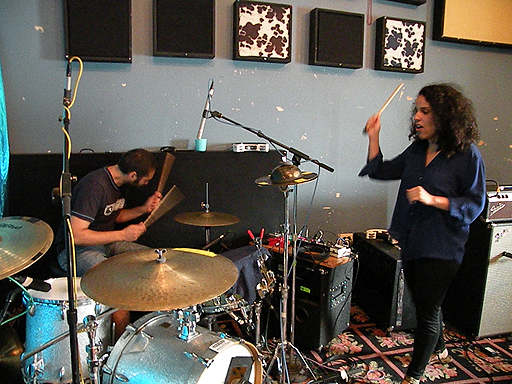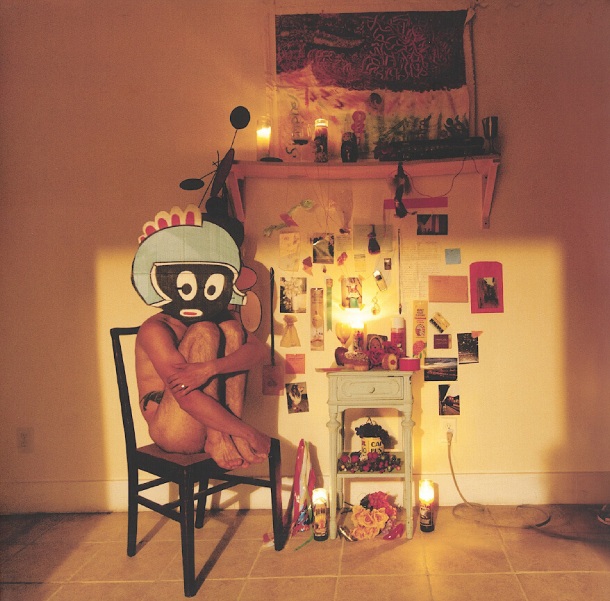In April of this year Xenia Rubinos released her debut album Magic Trix on Ba Da Bing Records. Praise for the record has come from the likes of Pitchfork, NPR, The New Yorker, and countless others, all of which have noted the way Xenia’s personality emerges in the record’s boundless energy and exuberance. Her music draws from a wide array of influences, from jazz to rock to R&B, and pushes forward into new territory, where seriously funky syncopated rhythms underscore gritty synths and smooth vocal slides.
I sat down for an interview with Rubinos before she opened for Man Man at the Great American Music Hall (read our review of the show).
When did you first start writing music and what was the inspiration for that?
I first started writing music when I was a child. I used to make up stories on the piano. I would say I was writing music for movies. Then ever since, I’ve always liked to play and discover things through music. Some of my earliest memories of being alive are singing songs and making things up.
Were your parents musical then?
No. My father was a lot of things in his life. He was a philosophy professor, chemistry professor, accountant, social worker, a lot of different things, but not a musician. He was a music lover. My mom as well; she’s a doctor but also loves music.
What kinds of music were you exposed to growing up?
Mainly 80s radio pop. My mom really liked Madonna and Boy George and Miami Sound Machine, so that was a big deal. I was really into Mariah Carey. I thought I was Mariah Carey or something. I wanted to be her. I dreamed of the day I would meet her. So these really power pop singers.
Then later, when I was a teenager, I got more into jazz music and thought I wanted to be a jazz singer, and then changed my mind.

Photo Courtesy WFMU
Were there any big influences from the jazz side?
When I discovered the music of Charles Mingus – he’s a bassist and composer – that really blew my mind. Ornette Coleman. I never knew you could write music like that. Also there’s this other more contemporary composer from Argentina, his name is Guillermo Klein. When I heard his music for the first time, I felt like maybe I could write music seriously. That was pretty important.
Is it right that you used to write more instrumental stuff?
Yeah, so I moved to Boston. I was working and living there, thinking that I was gonna do this jazz singing thing, but I quickly felt like it wasn’t for me and I couldn’t find my own voice. I didn’t feel like I had anything to say or that there was nothing to add, and I felt really lost. I stopped singing for a while and that’s when I started writing mostly instrumental music.
Did you find the transition into starting to write lyrics difficult?
Yes, I did. I found it very difficult, and I still find it very difficult because there’s a lot of judgment in words. I guess there’s judgment in music in general and that’s part of it, but it’s difficult for me to feel like my words have significance, that they should mean something important enough to tell people, and find something that hasn’t been said or to say it in a different way. Also, because I don’t consider myself a classic songwriter in the sense that I’m telling a story with a beginning, middle and end. That kind of lyric writing is not my strength. I really focus more on the musical content than the lyrics.
Your songs use these wordless vocalizations, are they part of that?
Yeah. Very rarely have I ever started a song by writing lyrics. I try to procrastinate to the very last moment possible. A lot of times what I’m saying doesn’t necessarily make any sense, but it does mean something to other people. It’s not really about having to tell a story in the classic sense per se. It’s more about the sounds of words and even the repetition of words and how those words sound when repeated or sequenced together.
Does writing in Spanish help?
It’s just another tool in the sandbox. It’s like having another instrument.
Let’s talk about Magic Trix. Did you write all the songs for it in one go?
No. Magic Trix I wrote over a period of about six or eight years. Some of the songs are that old, and others I wrote the year that I was working on that record. They’re actually kind of a mash up of my life over the past ten years. A lot of the pieces have changed wildly in that time. It was pretty incredible to see how they all worked together.
When I was getting ready to record it, I was getting concerned that it would sound like it was just a bunch of stuff put together. But when I took a step back – I worked with Marco Buccelli, who played drums on the record – he was like, “This totally makes sense.”
Thank gosh, because I didn’t know what else to do. I was lucky.
 Did you find with the older songs it was harder to say goodbye to them and put them out into the world in their completed versions?
Did you find with the older songs it was harder to say goodbye to them and put them out into the world in their completed versions?
That is really difficult. I feel like the song is never finished, especially when I get to play it live. It’s always changing. I don’t improvise on stage; we play the same show, the same song. We have that pop approach to the set.
We’re not changing it every night, but I do sometimes take some songs and put them back in the shop and work on them if I’m feeling like there’s something that needs to happen, because I feel like if I don’t do that, then they die. You have to take care of them and make sure they’re healthy.
How did you find the reception to the record? Was it what you were expecting?
Honestly, I was just so excited to get the record out. I couldn’t wait, and in fact I didn’t wait. I put it out myself with Marco on our company Jaba Jaba Music, which we started to put out the record, make videos, produce tours and do everything ourselves. We talked about finding a label and I thought, “Why should we wait until someone says, ‘Okay, you’re cool.’” So I was like, “We’re not gonna wait, we’re gonna do this ourselves.” Success for me was that I was just so proud of the record I had made and wanted to listen to it and share it with people.
Everything that happened afterwards was incredible. We worked really hard for it every single day. We met these great people at Ba Da Bing Records – that was a complete surprise, we were absolutely not expecting it – and put the record out and pressed it to vinyl and reissued it this spring, which gave it a whole other life.
I’m just so proud of Magic Trix. There are things that I dreamed of, but that I felt were so far from reality. But I guess when you put things out that you really want, they’re not as far as you think they are.
Is there anything that you learned from the process of recording and releasing your first record that will go into making the next one?
I definitely have anxiety about recording in general. I was extremely anxious during the recording of Magic Trix because it meant so much to me and it was my first record. I was lucky enough to have a team of people that I really love and trust. It felt natural and they made it as painless as possible. I also made the record in my home, so when I was nervous I could mop the floor or do something else. It was probably the cleanest my house has ever been.
I feel like in order to be good at making records you have to do it all the time, and I’ve only made one. I can’t say I’m an expert. But for sure I’ve learned so much in these past few years. I’m absolutely floored that I get to learn all of this stuff and I’m so excited that I get to keep learning. So I think there will be some kind of knowledge that I bring to the next thing. But overall, I’m excited to get to writing new music and figuring this out.
Magic Trix is out now on Ba Da Bing Records.
Article by Francesca Gonta



Leave a Reply